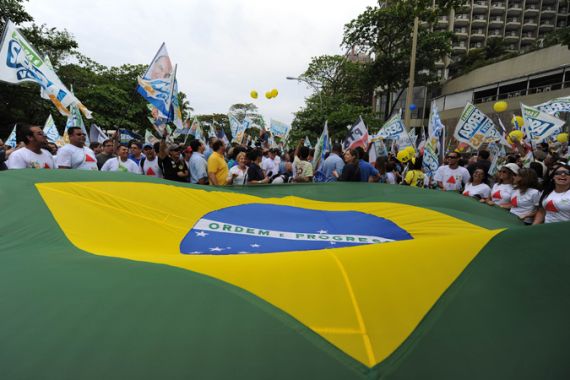Setting Brazil’s agenda
The runoff phase of the country’s presidential election has been shaped by a candidate who is no longer on the ballot.

 |
| The candidates have been competing to win over the 19.6 million Brazilians who voted for Marina Silva in the first round [EPA] |
When the first book is written about Brazil’s 2010 presidential elections the opening chapter will probably detail how the person with the greatest impact during the runoff phase was not even on the ballot on October 31.
That person is Marina Silva, a working-class senator from a small Amazon region state and much-acclaimed former environment minister.
In the first round of voting experts and poll-makers predicted that Silva, who was running on the weak Green Party ticket, would garner single digits. But she far exceeded those predictions, securing 19 per cent of the votes cast – the most for a third party candidate in more than 20 years.
That was enough to block leading candidate Dilma Rousseff of the Workers Party, who won 46 per cent of the votes in the first round, and Jose Serra of the Social Democrats Party, who won 32 per cent, from securing the 50+1 per cent needed to avoid a runoff. It also forced them to seduce the 19.6 million Brazilians who voted for Silva, instantly turning her into the agenda-setter.
As Rousseff and Serra have fallen over themselves trying to appeal to Silva voters, two main themes have emerged:
The environment – This is the main issue for Silva, who has won the UN’s top environmental defence award. Both Rousseff and Serra have tried to show their green credentials – inserting the word ‘sustainable’ into many of their speeches about economic growth. But most environmentalists remain skeptical, if grateful that the issue has been forced on to the table for a while at least.
The religious vote – As an evangelical, Silva is part of the fastest growing religious group in Brazil. Rousseff and Serra, neither of whom made a big show about their faith over the past year, have suddenly changed approach. As a result, abortion has become a big part of the political debate over the past month.
Ugly campaign
Silva decided to remain neutral during the second round, leaving the two main candidates to fight amongst themselves. And fight they have, with the relative civility of the past year of campaigning giving way to daily mud fights during the runoff.
Both have focused on the issue of corruption.
A series of corruption scandals aimed at Rousseff and the Workers Party have been relentlessly hammered home by Serra. The president’s chief of staff, who replaced Rousseff in the job when she decided to run for the presidency, was forced to resign over her alleged role in an influence peddling scheme. She has not been charged, but investigations should gain momentum after the election and Serra has been keen to remind voters that the woman in question is a close confident of Rousseff. While Rousseff has not been directly linked to the corruption charges that has not stopped Serra’s campaign playing the guilt by association card.
Rousseff’s camp has fired back, digging up dirt on a former Serra associate who has allegedly been linked to corruption. However, as recently as three weeks ago, the Serra camp’s tactics appeared to working, with signs that he was closing the gap on Rousseff. But polls just 48 hours before the election, show Rousseff regaining her footing with anywhere between a 10 and 15 per cent lead.
David Fleischer, a professor of political science at the University of Brasilia, says that the mud-slinging campaign originated largely with Serra and his party’s frustration over its inability to gain ground on Rousseff.
“This is because of the desperation of the Social Democrats Party. Serra continues to be way behind Rousseff in the second round so ‘anything goes’. And the Workers Party and Rousseff have responded in kind with accusations of corruption in Serra’s government in Sao Paulo [where he is governor],” Fleischer says.
Scenarios for victory
Rousseff has a comfortable lead and is running on the legacy of Lula da Silva, the current president who enjoys an 83 per cent approval rating. There are multiple scenarios in which Rousseff could win tomorrow. If everything stays the same as the first round in terms of votes and she manages to win over even fewer than 25 per cent of those who voted for Silva, it is game over and Rousseff wins.
Serra on the other hand needs a series of factors to fall in his favour. Firstly, he must hold the marginal leads he gained in states in the south such as Sao Paulo, Santa Catarina, Parana and Matto Grosso do Sul. After that, he needs to close the gap in vote rich Minas Gerais state – where he got clobbered by almost 2 million votes during the first round. If he does not close that gap, again, it is over. The northeast of Brazil is a lost cause for Serra. He just needs to get big vote totals in pockets of friendly cities within the northeast to keep Rousseff’s margins manageable. And lastly, Serra needs to really surprise people and get overwhelming support from former Silva voters.
If, and this is a big if, all of this happens, he can win. But it is a mammoth hill to climb.
If Rousseff wins it would be remarkable in several ways. She would be the first female president of Brazil. She is a cancer survivor. And she has never held elected office before. In her younger years she was jailed and tortured for her involvement in a Marxist movement.
Up until a few years ago she was virtually unknown, picked from relative obscurity by Lula to be the minister of mines and energy before being elevated to the position of chief of staff.
Serra, on the other hand, is probably the most prepared politician in the country to be president – on paper at least. He has nearly three decades in public office at the city, state and federal levels.
Despite the dour outlook in the polls, he is hoping that Brazilians will vote for experience and make him president.
The next president
Whatever happens on Sunday, come Monday morning Brazil will wake up to the beginning of the end of the Lula era.
In many ways Rousseff has offered few hard proposals on how she would differ from Lula’s policies and lead Brazil in a new era.
If she wins, she will be faced with the hard reality of governing without Lula as her boss.
“There are signs Brazil’s economy could go through a ‘cooling off’ period,” Fleischer says. “GDP in 2011 might be much lower – around the 4.5 per cent mark instead of 7 per cent like 2010. This means the cake will be smaller in 2011 – smaller pieces to deliver to an even larger number of political allies. The challenge will be to administer this in 2011.”
Under Lula, 23 million Brazilians have been lifted into the middle class, while tens of millions more who are far from being middle class, have nonetheless benefitted from social spending programmes under Lula’s government.
Balancing these two very new Brazilian realities will be crucial, Fleischer says.
“There will be a mandate for continuation of the social programmes of the Lula period, but with modifications to assure the status quo of the new middle class that has been produced by massive upper social mobility in recent years.”